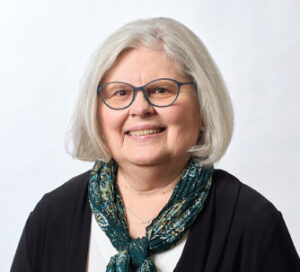President, CAMC Institute for Academic Medicine, Charleston Area Medical Center
By Dawn Nolan
Sharon Hall, president of Charleston Area Medical Center’s (CAMC) Institute for Academic Medicine, has spent her nearly 50-year career in health education positions in West Virginia.
“West Virginia has always been my home,” she says. “I am grateful to have had many opportunities to grow professionally and personally. Most importantly, I am grateful for the opportunity to be contributing to the future of health care education and academic medicine that is critical to the well-being and health of the citizens of West Virginia.”
In her current role, Hall provides executive leadership and oversight for all academic programs and departments within the institute, including accredited programs in medicine, nurse anesthesia and research.
Hall’s story is one of success. A first-generation college student, she utilized her can-do attitude to achieve her dream of earning her degree.
“I have humble roots. From a young age, I knew I wanted to go to college, but I also thought it was out of reach,” she says. “I remember registering for one semester knowing I could not continue without some sort of financial aid. I applied for everything I qualified for and received financial aid so I was able to complete my undergraduate education.”
Hall received her bachelor’s degree in political science with an emphasis in public administration from West Virginia University (WVU) and a master’s degree in management with a specialization in health care administration from Marshall University.
Her first professional job was as an admissions clerk in a teaching clinic in Morgantown before transferring to the WVU School of Medicine’s Charleston campus, CAMC Memorial Hospital, as a secretary in the continuing education program. She rose through the ranks to become education coordinator, then director of education and later an administrator of organization development and training. In 1997, Hall was tasked with planning and developing a strategic plan for education and research, which resulted in her becoming the first president and CEO of the CAMC Institute for Academic Medicine.
In this role, Hall leads efforts at CAMC in supporting graduate medical education by overseeing medical, pharmacy and psychology internships; residency programs; and the CAMC School of Nurse Anesthesia. In 2021, with growing recognition of the impact on education, research and academic medicine, CAMC restructured to establish the Institute for Academic Medicine, where she continues to serve as president.
“Throughout this journey, it has been my privilege to lead efforts for the development of many new programs and initiatives, including a statewide continuing education presence, a center for innovative learning and simulation, a corporate university responsible for leadership development at CAMC, research departments, a clinical trial center, research support units, distance and media education and other programs,” she says.
In addition to her day-to-day work, Hall is involved with several professional groups and associations. She is a member of the West Virginia School of Osteopathic Medicine Board of Governors, Association of American Medical Colleges Graduate Medical Education Leadership Competency Committee, Mountain State Osteopathic Training Initiative, WVU Physicians of Charleston Board of Directors and chair of the CAMC Institute for Academic Medicine Board of Directors.
From effectively and empathetically working with people to managing conflict and making difficult decisions, Hall has learned many lessons over the years.
“As a leader in health care, in the end it’s all about what’s right for the patients—it’s not about you,” she says.
Throughout her career, Hall has received many accolades recognizing her contributions to health education, including the William J. Maier Health Sciences Award from WVU Charleston Division and the inaugural Group on Resident Affairs Outstanding Service Award by the Association of American Medical Colleges. Most recently, she was recognized by CAMC leaders for her role in the planning and development of the Institute for Academic Medicine and the new Center for Learning and Research.
Advancing CAMC’s mission of education and research by growing programs from the ground up is what Hall considers her greatest professional achievement.
“This is indeed an exciting time; we are growing our academic footprint at CAMC, expanding programs, expanding research and recruiting some truly talented faculty and research scholars,” she says. “In the last four to five years, we have increased the number of interns, residents and fellows in our environment by 40% and created many new programs. I am proud to be part of this exciting work.”
Center for Learning and Research
Featuring three operating rooms, a critical care room, labor and delivery suite, five training rooms, eight inpatient rooms and six outpatient rooms equipped with the latest simulation technology, the CAMC Center for Learning and Research is another step in the health system’s strategic plan to advance and expand its medical and health science education programs.
“In October, we celebrated the opening of our new Center for Learning and Research, which is a symbol of an ongoing commitment to advancing health care in our region,” says Sharon Hall, president of CAMC Institute for Academic Medicine. “In the first month of opening, even as some equipment was being installed, more than 1,000 learners utilized the facility.”
Students from their affiliated regional education partner institutions can now learn in this new environment.
“Studies have shown that when students, residents and fellows train in the area, they are more likely to stay in our region for practice, improving access to highly trained providers in many medical specialties and other health sciences professions,” explains Hall. “It is all about bringing advanced care to our community.”
CAMC employees and staff as well as other health care professionals in the region use the facility to further develop their skills and learn new procedures.
“The center helps us recruit talented and experienced faculty, educators and researchers into our environment, allowing us to advance our learning through education and research and ultimately advancing the care for our community,” Hall says.




